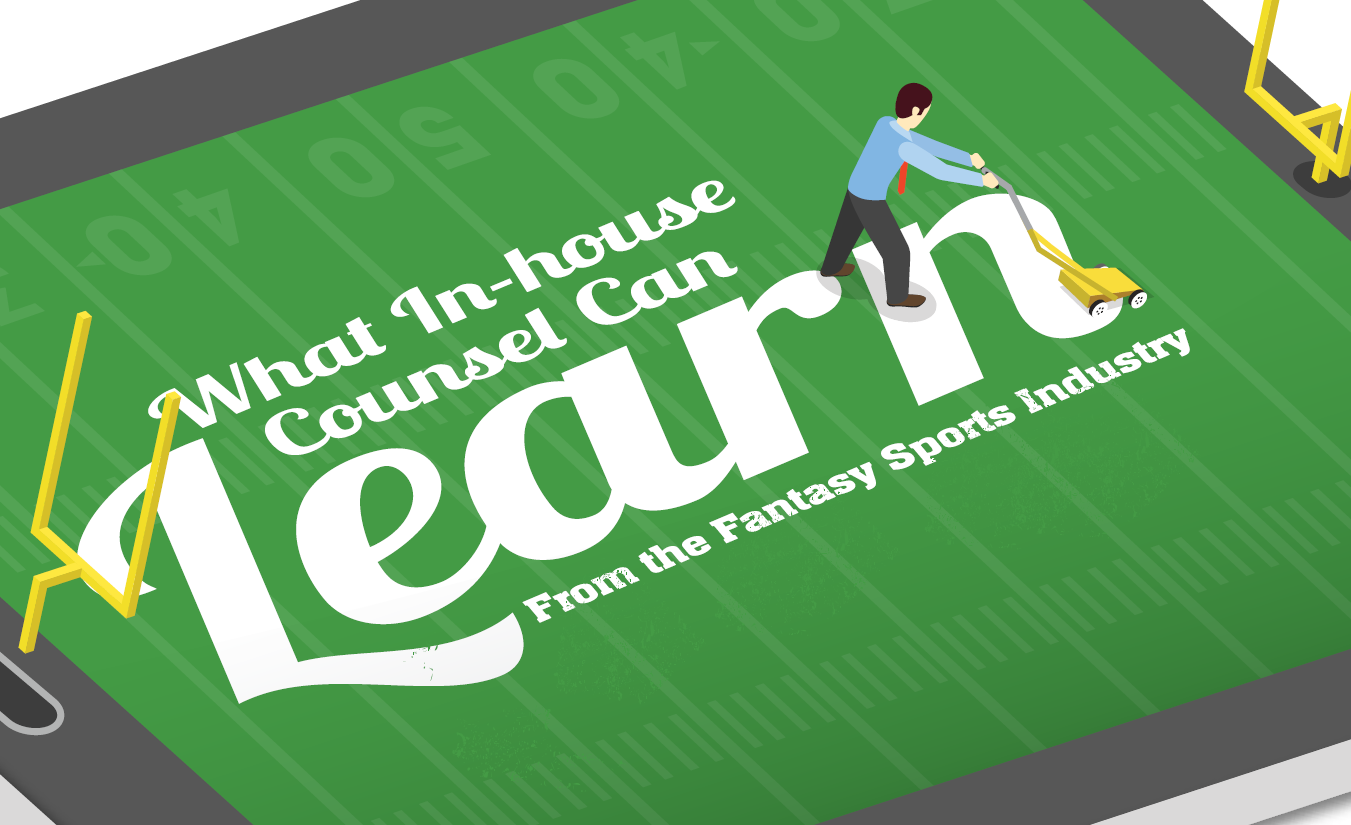
CHEAT SHEET
- Company promotions. In an attempt to learn from the risks of fantasy football, in-house counsel should restrict company promotions to two of the three elements of prize, consideration, and chance.
- Using the image. As with using the image of a football player in fantasy football, featuring a person in your company’s advertising without their permission violates publicity rights.
- Lobbying to protect. The approach that fantasy football companies used to lobby legislation can be translated to in-house counsel by timing lobbying efforts earlier rather than later.
- Consistency will protect. Companies that implement business models that strain regulatory requirements can help mitigate risk by making their records consistent.
In sports, failure to keep your eye on the ball can mean the difference between winning and losing. This expression captures the current predicament of the fantasy sports industry, an industry where bountiful venture capital funding and rapidly expanding revenue distracted from the legal complications descending on the industry and threatened to destroy it.
Beginning in 2015, the United States fantasy sports industry, led by companies DraftKings and FanDuel, grew exponentially. That growth attracted negative attention from state regulators and others. So much attention that the survival of the fantasy sports industry is not certain.
By examining what the fantasy sports industry has done well and what it might have handled differently, we also extrapolate to provide valuable lessons in-house counsel from diverse industries can learn from the fantasy sports meltdown including lessons related to conventional promotions, lobbying, consumer protection expectations, and the use of intellectual property.
Guidance for conventional contests, sweepstakes, and promotions
One general benefit from the fantasy sports industry meltdown is the increase in interpretive opinions relevant to the proper conduct of contests and sweepstakes. While most legal professionals reading this article are problably not setting their companies up as stakeholders in the fantasy sports industry, a significant percentage have likely confronted issues about company contests and sweepstakes. In that regard, in-house counsel who shepherd their companies through a promotion face one of the primary challenges now confronting the fantasy sports industry.
Just like a fantasy sports game in a jurisdiction that has not yet explicitly deemed them legal, company promotions may not combine the three elements of prize, consideration, and chance. Otherwise, the company promotion is an illegal lottery or a gambling game. Avoiding the illegality requires limiting the company promotion to only two of the three elements. Sweepstakes have the elements of chance and prize. Contests have the elements of prize and potentially consideration.
Even outside the fantasy sports industry, more than one company has inadvertently structured a promotion in a manner that turns an otherwise legal contest or sweepstakes into an illegal lottery or gambling game. That is, in part, because what qualifies as prize, consideration, and chance is not always straightforward. Each state turns to its own anti-gambling constitutions and statutes when making judgment. Unfortunately, most states lack an abundance of cases and opinions interpreting the relevant statutory and constitutional provisions, and much of what does exist in the states’ promotions jurisprudence pre-dates the internet. The newly released opinion letters, cease and desist letters, and other statements directed to the fantasy sports industry provide all of us with more guidance on the states’ views on chance and what factors prompt a regulator to view a promotion as an illegal lottery or gambling game.
Mixing people’s images, names, and biographical information into company products and ads
Featuring a person in your company’s advertising without permission violates the person’s publicity rights as well as other laws. The legality of featuring the person in a non-commercial, non-advertising context is more complicated. The complications result from the blurry line that separates commercial use from non-commercial and from the First Amendment balancing test to which even a non-advertising use must submit.
Publicity rights complaints in the fantasy sports industry
FanDuel, DraftKings, and smaller fantasy sports operators incorporate the name, likeness, and biographical information of professional athletes into their games (e.g., game line-up cards distributed online to participants feature images of athletes) and sometimes into their marketing. In the case of National Football League (NFL) players, DraftKings has a licensing deal with the NFL for such use. In contrast, for at least some period prior to 2016, FanDuel featured NFL athlete names, images, and information in connection with its games without a license from the NFL or the individual athletes.
In response, NFL player Pierre Garçon initiated an October 2015 class action lawsuit against FanDuel claiming FanDuel’s activities resulted in a violation of his and other NFL players’ publicity rights, which acts as a violation of the false endorsement provisions of the Lanham Act, and unjust enrichment. Garçon and FanDuel settled on confidential terms in January 2016. Also, in January 2016, according to the National Football League Players Association, FanDuel agreed to pay for licensing rights for NFL players to appear in the company’s marketing campaigns.
In early 2016, former Northern Illinois University football player Akeem Daniels filed a similar publicity rights lawsuit against FanDuel and DraftKings on behalf of himself and other college football and basketball players. Daniels’ lawsuit also settled within a few months.
Illustration of risks; CBC Distribution case
Despite their rapid settlements, Garçon and Daniels’ lawsuits illustrate the risks of borrowing celebrity personas without permission. This concern applies to all industries — not just fantasy sports. Recent high profile cases in other industries ending in litigation or settlement victories for celebrities include complaints filed by Michael Jordan against the Jewel Food supermarket chain and Dominick’s Finer Foods, Katherine Heigl against Duane Reed drugstores, and Woody Allen against clothing manufacturer American Apparel.
One wonders whether FanDuel would have triumphed had the lawsuit continued through trial. In a FanDuel statement issued shortly after Garçon’s lawsuit filing, the company said “there is established law that fantasy operators may use player names and statistics for fantasy contests.” The referenced established law includes the opinion in CBC Distribution and Marketing, Inc. v. Major League Baseball Advanced Media, L.P., 505 F.3d 818 (8th Cir., 2007).
In the CBC Distribution case, CBC, a fantasy sports company, licensed from the Major League Baseball Players Association the rights to use the names, likenesses, biographical data, and other indicia of players’ personas. Major League Baseball Advance Media is the for-profit internet arm of Major League Baseball. Since the player names were being used as a group, the players had assigned their publicity rights to the players association who then signed licensing deals. After the lapse of the license agreement, CBC sought a declaratory judgment that it could continue to use, without license, the players’ names and information.
The 8th Circuit agreed that CBC could do so, finding that such use was permissible under the First Amendment. Factors influencing the 8th Circuit’s decision included the facts that information used by CBC was readily available in the public domain, CBC used the names and information in an interactive form that qualified as expressive speech, and CBC included information about all players, thus negating any false impression of endorsement by highlighting only one or a few star players. By declining to hear the case in June 2008, the US Supreme Court let the 8th Circuit Court’s CBC Distribution decision stand.
Application of CBC Distribution might be limited
There are reasons that the CBC Distribution decision might not be determinative for fantasy sports use specifically and for celebrity persona uses more generally.
The First Amendment balancing test. Use of another’s persona is subject to a balancing test between an individual’s right of publicity on one side and the First Amendment on the other side. Courts have been inconsistent in their approaches to evaluating this balance.
There are at least five different tests used by the courts. The tests include the transformative use and transformative work test borrowing from the copyright fair use concepts; the newsworthiness test; the colloquially-named Rogers test (as in dancer and actress Ginger Rogers) developed in Rogers v. Grimaldi, 875 F.2d 994 (2d Cir. 1989), which focuses on artistic relevance; and the predominant test which evaluates whether the use exploits the person’s commercial value; or, instead, offers an expressive commentary about the person. Different tests applied to similar fact situations yield contrasting results.
Relevant state law matters.
Publicity rights laws are state-based and vary widely. In the CBC Distribution case, the 8th Circuit applied Missouri law. Missouri is also home to Doe v. TCI Cablevision, 110 S.W.3d 363 (2003), a Missouri Supreme Court decision that used the predominant test when evaluating the legality of a comic book villain loosely based on former National Hockey League player, Anthony (Tony) Twist. Many point to the TCI Cablevision decision, a case which resulted in a US$15 million damage award against the comic book creators, as illustrative of the inconsistency and unpredictability generated by the divergent First Amendment-right of publicity balancing mechanisms.* The Garçon and Daniels’ publicity rights suits were filed in federal courts within Maryland and Illinois, respectively, so it is questionable how closely those courts would have followed the CBC Distribution holding.
* In contrast, Winter v. DC Comics, 69 P.3d 473 (2003), a California Supreme Court case with strikingly similar facts to the Cablevision TCI decision and applying the transformative test, ruled in favor of First Amendment protection for comic book characters evoking musician brothers Johnny and Edgar Winter.
A picture might be worth more monetary damages.
In its ruling, CBC Distribution and a predecessor sports-related case, National Basketball Association v. Motorola, 105 F.3d 841 (2d Cir. 1997), address the permissibility of use of names and statistics only. The Motorola case held that it was permissible for third parties to distribute live NBA in-game score information. A court might view the use of names and statistical information as distinct from the use of a person’s image.
This is due to a sense of “playground fairness” says Sam Bayard, an associate at Davis Wright Tremaine in New York who has scrutinized these opinions while working on publicity rights cases involving videogame producer Electronic Arts. “Doctrinally, right of publicity law does not recognize a principled distinction between the use of someone’s name versus the use of someone’s likeness, and the First Amendment absolutely protects works of visual art to the same degree as text, but courts (as well as the general public) tend to have a gut reaction that using someone’s image without compensation is more unfair or objectionable than simply writing about them in text,” Bayard explains.
Additional laws to consider.
There are other substantive laws in addition to publicity rights to consider before using the persona of other people. Those substantive legal areas include the right of privacy, libel, and copyright ownership when using photographs and likenesses captured by others.
Role and timing of lobbying
Another lesson that in-house counsel can learn from the fantasy sports industry is mastering the approach to lobbying. Fantasy sports industry companies and associations have reportedly spent over US$10 million on lobbying efforts.
A significant portion of that lobbying has occurred during 2016 when DraftKings and FanDuel worked with over 78 lobbyists across 34 states. That is a tremendous increase from the small handful of lobbyists reportedly retained by the companies in 2015 prior to the industry becoming a focal point for negative attention.
Viewpoints differ on whether industry lobbying should have commenced earlier. “It’s better to lobby earlier rather than later,” opines Brian Kane, assistant chief deputy attorney general of Idaho. Kane suggests early lobbying allows companies to establish relationships with key regulators and legislators, learn their primary concerns, explore solutions for overriding regulatory objections, and fashion compromises that can obviate any formal state action against the company. In Idaho, early contact with regulators and legislators at the commencement of Idaho’s review of the industry likely contributed to a May 2016 agreement with FanDuel and DraftKings to cease offering paid DFS games in Idaho. While probably not the ideal result from the DFS operators’ perspective, the negotiated Idaho agreement was likely preferable to an Idaho opinion letter explicitly labeling DFS as illegal in the state.
With respect to timing for lobbying, there is another point of view that advocates acting first and then asking for forgiveness rather than asking for permission just to have that permission denied. In that school of thought, the company first establishes itself or its program — and subsequently deals with applicable regulations and laws that might be out-of-date. This is especially relevant for a rapidly emerging company that enters an established marketplace and implements technologies, business practices, and methods that some might view as disruptive. If the company’s service or product is popular — as DFS certainly is — there is pressure on governors and legislators to open their states to those services and products.
Regulators also see the lobbying benefits for a company with an existing track record. “For businesses in the customer service industry, having customers with positive experiences is a tremendous asset in lobbying,” says Kane. As an example, Kane remembers how the car service Uber entered Idaho markets much later than its entry into other US markets. “By the time Uber began discussions with regulators and legislators in Idaho, Uber had many Idaho fans who wanted the company to be able to enter Idaho markets. Those fans included some Idaho legislators who had learned about Uber during attendance at related conferences in other states.”
Divonne Smoyer, a partner at Reed Smith who represents clients on legal and policy matters in state attorneys general offices, echoes the sentiment regarding the lobbying benefits of perceived desirability. “Newer industries have the panache of appealing to younger, more open-minded consumer markets. Sexy technologies benefit lobbying companies by appealing to regulators and legislators’ desire to appear progressive.” Smoyer says.
With respect to the ultimate outcome for DFS and SFS, Bruce Taylor, co-owner of Seattle-based Fantasy Index magazine, predicts “I cannot imagine, in the long run, [the states] want to kill this game. I believe the states will see the potential tax income as a revenue source and create a model that protects their residents.”
Differences between daily (DFS) and season-long (SFS) fantasy sports games
To understand the differences between DFS and SFS games, we spoke with ACC members who play fantasy sports.
SOME SFS CHARACTERISTICS
The vast majority of our interviewees engaged in season-long fantasy football leagues with a small circle of friends. “We clearly do it for fun, don’t deem ourselves experts, and mostly do it as a way of keeping in touch,” shares Ryan Evans, an ACC member of the Sports & Entertainment Committee and general counsel of Jack in the Box who serves as the appointed commissioner of his friends’ season-long game.
Since SFS football is usually about relationships, it is common for the in-house attorney to be selected as the league commissioner by their friends. It must be the “trust” and “impartial” attribute of in-house counsel that led them to such a prestigious role.
For season-long fantasy football, a commissioner is appointed prior to the NFL season but after the NFL draft. The SFS-appointed commissioner then selects a draft date for the fantasy game and the team owners/friends begin to do research on their fantasy game draft selections. There are a few potential methods for fantasy game participants to select athletes for their rosters. Common methods of player selection in fantasy sports include a snake draft, an auction draft, and a salary-cap draft.
Snake draft. In a snake draft, on draft day, teams/friends take turns picking their draft picks without regard to the athletes’ salaries or any salary cap restrictions. This is basically a selection process that forces a balanced team where the overall quality of the team’s players, in relation to other teams, will be pretty even. In other words, each team is likely to have mix of elite, mid-tier, and sleeper players. Most of our ACC interviewees participated in leagues using the snake draft method.
Salary cap draft and auction draft. With these methods, each participant has a salary cap or maximum budget to use in athlete selection. The two methods differ in that two participants can have the same athletes on their respective simulated teams with the salary cap draft method. In auction drafts, there is no such athlete overlap on participants rosters.
The largest unknown factor that that can have a dramatic negative impact on one’s team is injuries. In SFS leagues, injuries to your top athletes can cripple your fantasy team for the remainder of the season. While an injury can kill your chance of winning for the season, the actual opponent each week in the official NFL schedule has minimal effect on the overall SFS season. In fact, no correlation has been found between a team’s ranking and their season schedule because over the course of an entire season, the overall strength of the team’s schedule tends to even out when compared to other teams.
Another factor that attracts SFS players is the limited lineup choices. Each team will need to make only one or two decisions per week from the available player pool but it is confined to that team’s particular roster. This is a huge time saver!
In the end, beyond the value of the bonding impact among friends, the potential winnings available within a SFS league are minimal. Perhaps this is why novice players tend to gravitate to the SFS model over the daily fantasy games. During his talk with us, Evans expressed the hopes that the new fantasy sports laws leave the season long games alone so he can continue to have fun, lose money in the pool, and keep the title “commissioner” for just a wee bit longer.
SOME DFS CHARACTERISTICS
In contrast to SFS games, DFS games require a participant to select a roster of athletes on a weekly basis. Since the rosters tend to be smaller, the time needed to draft the athletes each week decreases. The main consumption of time is twofold: 1) figuring out just how the athlete’s salary will fit under the team’s salary cap; and 2) selecting the correct strategy on how one might select their talent (i.e., a few elite/high round type athletes along with a few low-priced value athletes).
Another key difference is that injuries don’t have such a detrimental impact on the DFS teams because a gamer can change their roster each week, rather than be inflicted with an injured athlete for the entire season. While this model may decrease the impact of an injury, it does increase the significance of the matchups on a week by week basis. Since the gamer is only looking at the scores of one week, the schedule created by the NFL plays a greater role. For instance, in DFS, an athlete’s value is strongly linked to his weekly opponent, versus the athlete’s value in the SFS where there are 16 weeks in the total season. In sum, DFS games are just as much about the opponent as they are about the athlete’s value in question.
Importance of protecting consumers
FanDuel and DraftKings problems developed in part due to alleged exploitation of consumer participants. Kane advises companies with potentially disruptive business models to consult with a local attorney and meet with the state’s consumer protection division or attorney general office prior to introducing services or products into the state. According to Kane, crucial steps for a company consumer protection audit include knowing your regulators, implementing a good consumer protection model practice, and responding to state regulatory inquiries. “Companies can short circuit complaints if a company responds to an AG inquiry with “Yes, I’ll take care of it,” Kane says. “If a company doesn’t respond to a state inquiry, the AG’s only alternative is to advance the situation and take the next step and go to court.”
Consumers are not the sole source of complaints. AG offices also receive complaints from competitors and from legislators, who may be contacted by constituents. Kane offers the auto industry as an example. “In the auto business, we get more complaints from competitors than from consumers. Competitors look at ads — and know the company can’t make that offer (e.g., incentive package). Competitors understand the landscape and are sufficiently savvy enough to know when an offer is not a competitive offer. Competitors are very aggressive in blowing the whistle.”
Potential danger of third party relationships
Financial partners of fantasy sports operators include professional sports leagues, media companies, and financial institutions. According to court filings, DraftKings’ investors and partners include (or at one point included) Fox Sports, Major League Baseball, and the owners of the NFL’s New England Patriots and Dallas Cowboys; and FanDuel’s include (or at one point included) the National Basketball Association, NBC Sports Ventures, and ComcastVentures.
Some DFS partners were named as defendants in class action lawsuits filed against DraftKings and FanDuel. This phenomenon of “lawsuit target per association” is not unique to the fantasy sports industry. Music publisher Bertelsmann was sued by its fellow music publishing companies after Bertelsmann invested US$100 million in Napster, a company that disrupted the music industry by distributing free online copies of its proprietary filesharing software during its 1999 start-up incarnation. At the time of Bertelsmann’s investment, Napster’s primary use was the unauthorized file-swapping of copyrighted materials and several music industry companies had pending copyright infringement lawsuits against Napster. The music publishers claimed that Bertelsmann’s funding allowed Napster to extend its life, which led to greater numbers of copyrighted works being shared illegally. Bertelsmann’s ultimate settlement with the music publishers cost the company tens of millions of dollars.
The lesson to be learned is exercise caution when choosing business partners and consider how questions about your partner’s business practices might affect you. In the DFS industry, credit card companies, sports teams, and networks have severed relationships with DraftKings and FanDuel due to legal uncertainty surrounding the games.
Consistency counts
Companies implementing business models and practices that might strain against the boundaries of statutory and regulatory requirements can learn from the fantasy sports operators’ consistency missteps. In response to government scrutiny, fantasy sports companies argued to regulators that their platforms were not gambling and described their offerings as skill-based contests. However, those same companies frequently used gambling terms in other environments. That inconsistency hurt them in subsequent discussions with state regulators.
As an example, the Nevada Office of the Attorney General remarked on the inconsistency. In an opinion letter, the office concluded that DFS constitutes a sports pool, a gambling game, and potentially a lottery; and prohibited the operation of unlicensed pay-to-play DFS in Nevada. Nevada regulators found noteworthy that in social media discussions, DraftKings CEO Jason Robins described the company as ‘‘almost identical to a casino’’ and as “a mashup between poker and fantasy sports” and repeatedly referred to the payments made to DraftKings as ‘‘wagers’’ and ‘‘bets,’’ and to the activity as ‘‘betting.”
The Nevada regulators also found noteworthy that when expanding its operations to the United Kingdom, which does permit online sports gambling, DraftKings obtained United Kingdom licenses for pool betting and gambling software.
Conclusion
At the current moment, whether or not a fantasy sports league comprises gambling within a particular state is state specific. It depends on the individual state’s gambling laws and how the state evaluates the structure of the particular fantasy sports game.
Further Reading
§43 of the Lanham Act, 15 USC. §1125.
Garçon v. FanDuel Inc., Complaint filed in D. Md. on Oct. 30, 2015, Case No. 8:15-cv-03324-PJM.
Daniels v. DraftKings Inc., Daniels v. FanDuel Inc., Complaints filed in N.D. Ill. on Jan. 27, 2016, Case Nos. 1:16-cv-01220, 1:16-cv-01223.
Nev. Att’y Gen. Op. (Oct. 16, 2015), *2 at note 1, 10.





